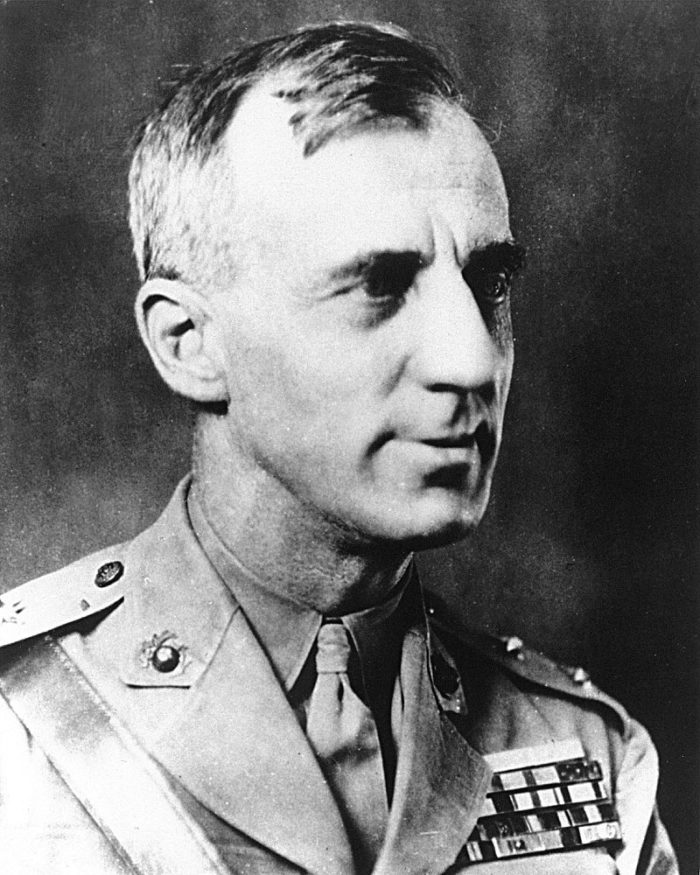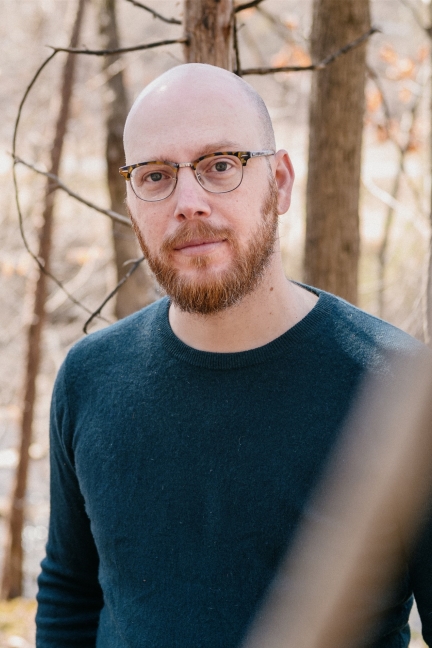by Jonathan M. Katz
Gangsters of Capitalism by Jonathan M. Katz tells the story of America’s forgotten path to global power through the incredible life of Smedley Butler. Read on for an excerpt.

This image is in the public domain via WikiCommons.
The bankers’ men were back. Smedley Butler sized up the one doing all the talking—the bond salesman in the tailored suit. The visitor was sitting in the vaulted main hallway the Butlers used as a living room, his cannonball-shaped head framed by the retired general’s old command flags, medals, swords, and assorted tropical bric-a-brac. Two mammoth red satin umbrellas, given to Butler by villagers on his last overseas mission, to China, swayed gently overhead atop their fifteen-foot poles.
The bond salesman, one Gerald C. MacGuire, represented himself as a member of the American Legion, a veterans’ organization founded at the end of the Great War. He was trying to persuade Butler to come to the next Legion convention, in Chicago, to give a speech denouncing President Franklin Delano Roosevelt—specifically his recent decision to take the dollar off the gold standard. Butler, the salesman said, would travel in secret with a few hundred legionnaire friends. Once they were at the convention, they would spread out around the assembly and start a chant to demand that Butler be given the floor.
What rank-and-file veteran could afford a five-day trip to Chicago in the middle of the Great Depression, Butler wondered. MacGuire replied it would all be taken care of: train tickets, hotels, everything.
“How do you get the money to do that?” the general asked.
“Oh, we have friends,” MacGuire responded. Then he opened a bank book showing $42,000 in deposits—worth over $850,000 nearly a century later.
Butler was accustomed to people asking him for favors. It was the price of fame. For thirty-three years and four months he had been in active service as a United States Marine, a veteran of nearly every overseas conflict dating back to the war against Spain in 1898. Respected by his peers, beloved by his men, he was known throughout the country as “The Fighting Hell-Devil Marine,” “Old Gimlet Eye,” “The Leatherneck’s Friend,” and the famous “Fighting Quaker” of the Devil Dogs. Bestselling books had been written about him. Hollywood adored him. President Roosevelt’s cousin, the late Theodore himself, was said to have called Butler “the ideal American soldier.” Over the course of his career, he had received the Army and Navy Distinguished Service Medals, the French Ordre de l’Étoile Noir, and, in the distinction that would ensure his place in the Marine Corps pantheon, the Medal of Honor—twice.
But most who asked for an audience at the general’s converted farmhouse in Newtown Square, a suburb on Philadelphia’s Main Line, did not carry thick bankbooks, as the bond salesman did. Nor did they pull up in his dirt driveway in a chauffeured Packard limousine. Butler wanted to know more. Asking around in the days that followed, he learned MacGuire had been a Navy man in the World War, and had suffered a skull fracture at sea in 1918—off the exact spot on the coast of France where Butler had been stationed. That explained the ties to the American Legion, if little else.
Over the following weeks, MacGuire continued the courtship. In Newark, where Butler was attending the reunion of a National Guard division,MacGuire showed up at his hotel room and tossed a wad of cash on the bed—$18,000, he said.
“You put that money away before someone walks in here,” Butler barked. Then he asked where all the money was coming from. MacGuire told the general he was working for several wealthy backers. One of them was Robert Sterling Clark—an heir to the Singer sewing machine fortune, whom Butler had known as a lieutenant in China during the Boxer Rebellion decades earlier. Another was MacGuire’s boss, the well-connected financier Grayson M.-P. Murphy, who had close ties with the nation’s most powerful bank, J. P. Morgan & Co., and Wall Street’s most influential law firm, Sullivan & Cromwell. Clark himself paid a visit to the Newtown Square house soon after, hinting broadly that he would cover the Butlers’ mortgage if the Marine played ball.
The dates of the American Legion convention came and went. Butler did not go. But then, a few months later, in early 1934, Butler received a postcard from MacGuire. It was sent from the French Riviera, where the bond salesman had just arrived after visiting Fascist Italy. About two months later, Butler received another postcard, this time from Germany. The Reichstag fire had happened a year earlier. Hitler was now chancellor, on his way to becoming führer. MacGuire said he was having “a wonderful time” in Berlin.
In August 1934, MacGuire called Butler from Philadelphia and asked to meet. Butler suggested an abandoned café at the back of the lobby of the Bellevue-Stratford Hotel.
“The time has come to get the soldiers together,” MacGuire said.
“Yes,” Butler replied. “I think so, too.”
He had no idea what they were talking about. He just wanted the salesman to keep talking until the outlines of what he was really after became clear.
First MacGuire excitedly recounted all he had seen in Europe. In Fascist Italy and Nazi Germany, he’d learned that Mussolini and Hitler were able to stay in power because they kept soldiers on their payrolls in various ways. “But that setup would not suit us at all. The soldiers of America would not like that,” the businessman opined.
But in France, MacGuire had “found just exactly the organization we’re going to have.” Called the Croix de Feu, or Fiery Cross, it was like a more militant version of the American Legion: an association of French World War veterans and paramilitaries organized under the populist authoritarian Col. François de La Rocque. On February 6, 1934—six weeks before MacGuire arrived—thousands of members of the Croix de Feu had taken part in a riot of mainly far-right and fascist groups that had tried to storm the French legislature. The insurrection was stopped by police; at least fifteen people, mostly rioters, were killed. But in the aftermath, France’s center-left prime minister had been forced to resign in favor of a conservative.
MacGuire had attended a meeting of the Croix de Feu in Paris. It was the sort of “super-organization” he believed Americans could get behind—especially with a beloved war hero like Butler at the helm.
Then he made his proposal: The Marine would lead half a million veterans in a march on Washington, blending the Croix de Feu’s assault on the French legislature with the March on Rome that had put Mussolini’s Fascisti in power in Italy a decade earlier. They would be financed and armed by some of the most powerful corporations in America—including DuPont, the nation’s biggest manufacturer of explosives and synthetic materials.
The purpose of the coup was to stop Roosevelt’s New Deal, the president’s program to end the Great Depression, which one of the millionaire du Pont brothers had deemed “nothing more or less than the Socialistic doctrine called by another name.” Butler’s veteran army, MacGuire explained, would pressure the president to appoint a new secretary of state, or “secretary of general affairs,” who would take on the executive powers of government. If Roosevelt went along with this, he would be allowed to remain as a figurehead, like the king of Italy. Otherwise, he would be forced to resign, placing the new super-secretary in the White House.
Smedley Butler knew a coup when he smelled one. He had been in many himself. He had overthrown governments and protected “friendly” client ones around the world on behalf of some of the same U.S. bankers, lawyers, and businessmen who were apparently trying to enlist his help.
It had been largely on their behalf that Butler and his Marines trained and helped put into power the Hitlers and Mussolinis of Latin America: dictators like the Dominican Republic’s Rafael Trujillo and Nicaragua’s soon-to-be leader, Anastasio Somoza, who would employ violent repression and their U.S.-created militaries to protect American investments and their own power. MacGuire’s easy dismissal of electoral democracy recalled the disdain for other republics past U.S. presidents had shown. The resulting interference in other countries’ affairs had been prodded on and aided by moneyed interests like J. P. Morgan; MacGuire’s boss, Grayson Murphy; and their globetrotting lawyer friends at Sullivan & Cromwell.
In other words, Butler knew these people. He knew the world they traveled in. He had made a life in the overlapping seams of capital and empire, and he knew that the subversion of democracy by force had turned out to be a required part of the job he had chosen. “I spent most of my time being a high-class muscle man for big business, for Wall Street and for the bankers,” Butler would write a year later. “In short, I was a racketeer for Capitalism.”
And Butler knew another thing that most Americans didn’t: how much they would suffer if anyone did to their democracy what he had done to so many others across the globe.
“Now, about this super-organization,” MacGuire asked the general. “Would you be interested in heading it?”
“I am interested in it, but I do not know about heading it,” Butler told the bond salesman, as he resolved to report everything he had learned to Congress. “I am very greatly interested in it, because you know, Jerry, my interest is, my one hobby is, maintaining a democracy. If you get these five hundred thousand soldiers advocating anything smelling of fascism, I am going to get five hundred thousand more and lick the hell out of you, and we will have a real war right at home.”
Jonathan Myerson Katz received the James Foley/Medill Medal for Courage in Journalism for reporting from Haiti. His first book, The Big Truck That Went By, was shortlisted for the PEN/John Kenneth Galbraith Award for Nonfiction and won the Overseas Press Club’s Cornelius Ryan Award, the J. Anthony Lukas Work-in-Progress Award, and the WOLA/Duke Book Award for Human Rights in Latin America. His work appears in the New York Times, Foreign Policy, and elsewhere. Katz was a New America national fellow in the Future of War program and received a fellowship from the Logan Nonfiction Program. He lives with his wife and daughter in Charlottesville, Virginia.

